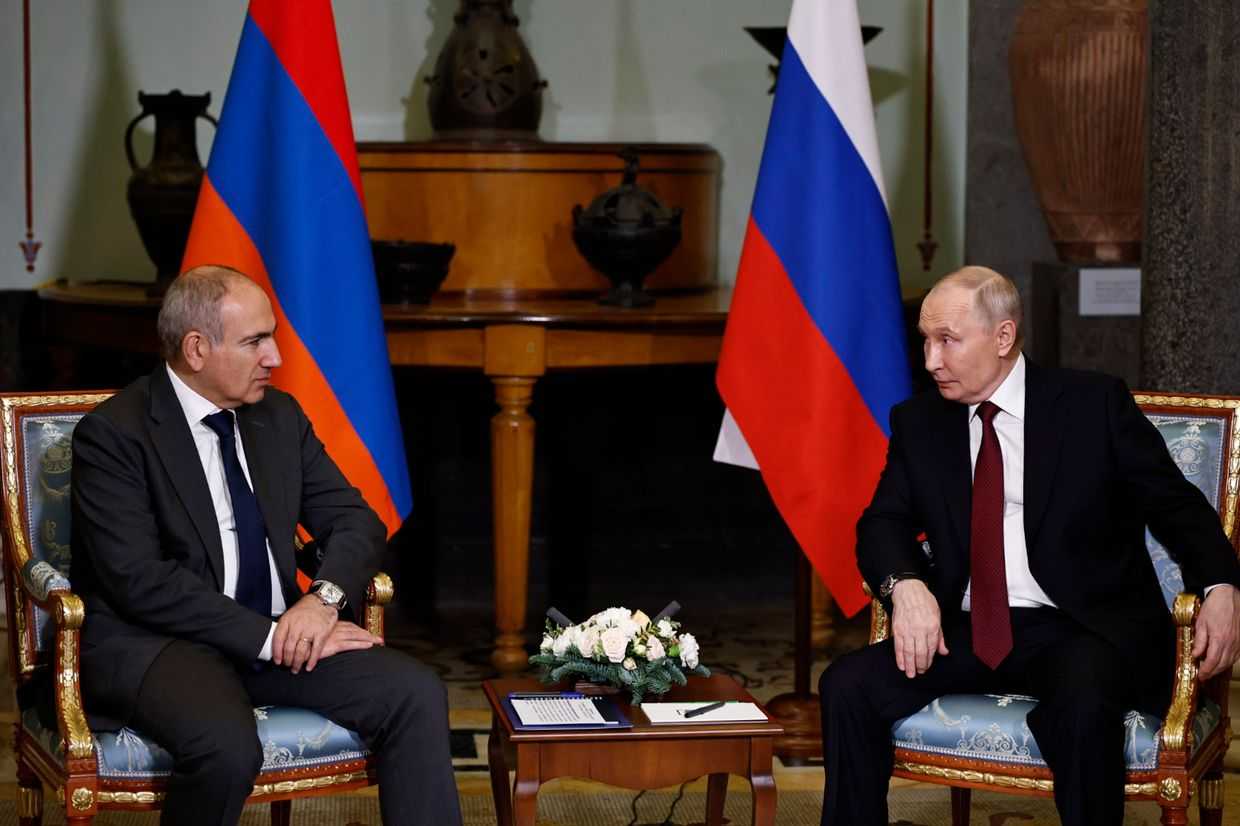
Armenian Prime Minister Nikol Pashinyan and Azerbaijani President Ilham Aliyev have instructed their foreign ministers to finalise a peace deal ‘in the shortest possible period’, after a meeting in Russia. The following day, Aliyev signed a regulation that would allow the demarcation process with Armenia to move forward.
Pashinyan and Aliyev met on the sidelines of the 16th BRICS summit in Kazan, Russia, in a meeting that reportedly lasted over an hour.
Following the meeting, Pashinyan and Aliyev’s offices published nearly identical statements saying that the ‘foreign ministers [of Armenia and Azerbaijan] were instructed to continue bilateral negotiations’ on the peace treaty. The statement said that the two leaders discussed the delimitation and demarcation of their shared borders.
Prior to the meeting, videos surfaced showing Pashinyan and Aliyev talking to each other while seated at the summit’s roundtable. TASS added that Aliyev and Pashinyan were ‘engaged in a lively conversation’, and that they were joined by their foreign ministers at some point during the exchange, which also reportedly lasted an hour.
TASS reported that leaders attending the summit were seated around the table in alphabetical order.
The Russian state-owned news agency also quoted Kremlin spokesperson Dimitry Peskov as saying that Aliyev and Pashinyan’s conversation at the roundtable ‘did not interfere with the general discussion’ of the summit.
On Friday, MPs from Armenia’s ruling Civil Contract party refused to provide any details about the talks, stating that Pashinyan’s office would publish additional information about them ‘at an opportune time’, and that Armenia’s position on a prospective peace deal had not changed.
Two months ago, Pashinyan proposed to sign an interim peace treaty based on articles it had agreed on. Azerbaijan refused despite similarly proposing to do so earlier this year, with Aliyev suggesting that the treaty would be signed ‘when we agree on everything’.
Last week, an MP from the Civil Contract party said that Pashinyan offered to sign a peace agreement ahead of the COP29 summit in Baku.
[Read more: Peace talks flounder as Armenia pushes for deal with Azerbaijan before COP29]
Border delimitation and ‘the right path towards peace’
On Friday, a day after the meeting, Aliyev signed a decree approving the regulation of the joint activity of Armenia and Azerbaijan’s border delimitation commissions.
Armenian President Vahagn Khachaturyan signed the Armenian version of the document on Thursday after the Armenian Parliament ratified it earlier this week.
The regulation stipulates that it will come into effect as soon as both countries notify each other of their completion of all internal procedures to approve it, and that it will be valid until Armenia and Azerbaijan conclude the demarcation of their borders.
In his address at the BRICS summit in Kazan, Pashinyan said that Armenia and Azerbaijan ‘will be able to activate the process of demarcation’ as soon as the regulation comes into force in both countries.
Russian President Vladimir Putin commented on the delimitation process, saying that he is pleased that it has started and that ‘it is the right path towards peace’.
He also praised the ‘exchange of views’ during the summit, adding that it was ‘already positive for our event.’
On Wednesday, US State Secretary and Turkish Foreign Minister Hakan Fidan discussed the ‘importance of achieving a just and durable peace in the South Caucasus’.
Earlier this week, US President Joe Biden sent two letters to Aliyev and Pashinyan, respectively, encouraging them to ‘finalise an agreement this year’.
Both letters were hand-delivered by his Special Assistant Michael Carpenter, whom Biden assigned to brief the two leaders on ‘some of the steps’ the US wants to take toward cementing a peace treaty.
No additional information has been made public regarding the steps Washington proposed to Armenia and Azerbaijan.









